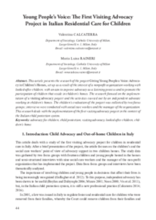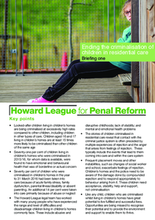Displaying 851 - 860 of 1511
The 24 chapters of this book contain research examining the institutionalization of children, child abuse and neglect in residential care, and interventions preventing and responding to violence against children living in out-of-home care settings around the world.
This chapter from Child Maltreatment in Residential Care presents the key findings from the Bucharest Early Intervention Project (2003), a longitudinal randomized control study which revealed the immense developmental impact of the severe deprivation experienced by children placed in institutional care shortly after birth.
This paper provides evidence-based guidance on the use of family interventions involving children with a history of institutionalization prior to their placement in family-based care through foster care, adoption, or reunification with their families.
This article presents the research of the project "Giving Young People a Voice: Advocacy in Children’s Homes," which evaluated the implementation of a visiting advocacy project and services provided by an independent advocate working in children's homes in Italy.
In this video, Philip Goldman, President of Maestral International, discusses how donors, faith communities, advocates and other committed actors can be brought together under the common belief that all children belong in families.
This study investigated and compared electroencephalogram (EEG) functioning between a group of institutionalized adolescents and a never institutionalized group of adolescents during a social decision making task.
This study aimed to test the effectiveness of life skills education (LSE) and psychoeducation in the reduction of Youth Self Report (YSR) scores on institutionalized children in Kenya, using structured activities supported by trained facilitators.
On 21-22 June 2017, the African Child Policy Forum and Better Care Network - with the support of Catholic Relief Services, Family for Every Child, Hope and Homes for Children and Save the Children - convened 40 leaders representing child rights bodies, regional economic communities, national governments and civil society in Nairobi, Kenya for the Africa Expert Consultation: Violence Against Children in All Care Settings.
This country care review includes the care-related Concluding Observations adopted by the Committee on the Rights of the Child during the seventy-fifth session (15 May 2017 - 02 Jun 2017) of the Convention on the Rights of the Child.
This briefing the first in a series describing a programme of the Howard League for Penal Reform, which is intended to clarify why so many children in residential care in England and Wales are being criminalised at higher rates than their peers and identify examples of best practice to prevent their unnecessary criminalisation.





